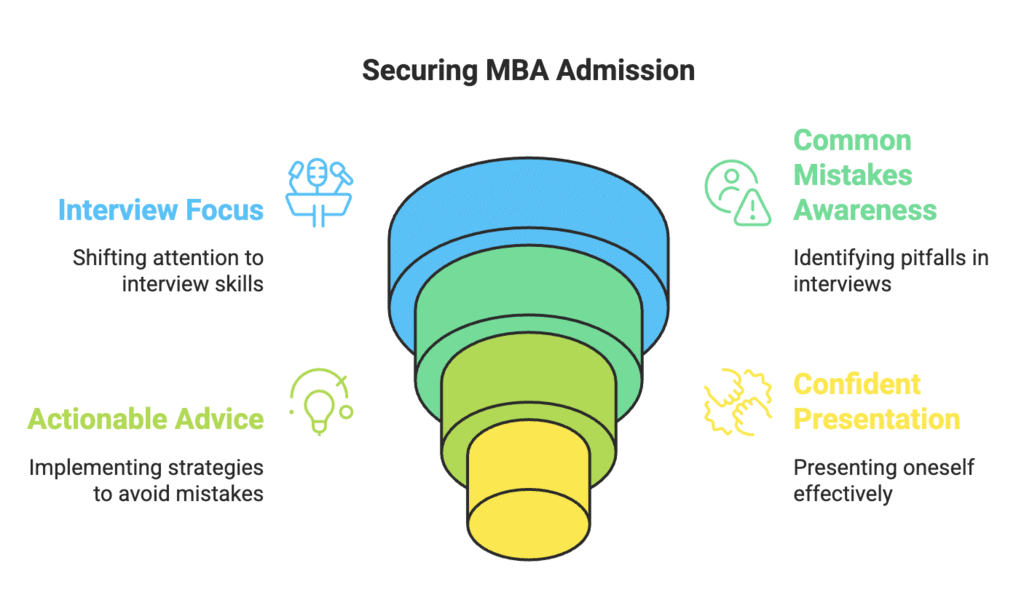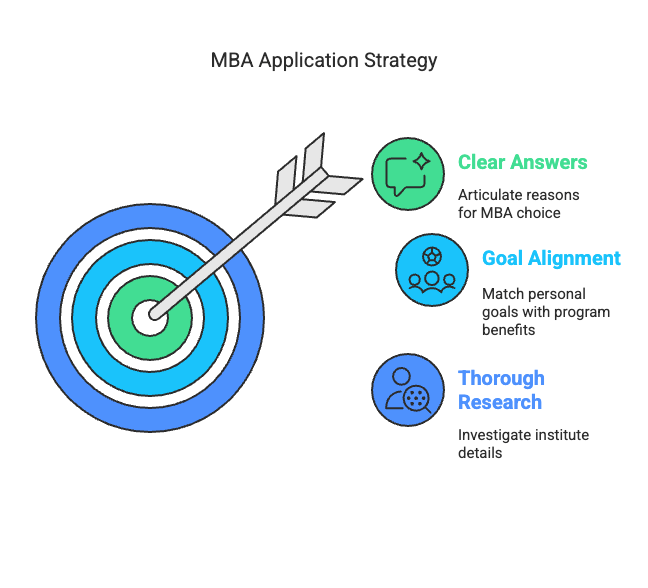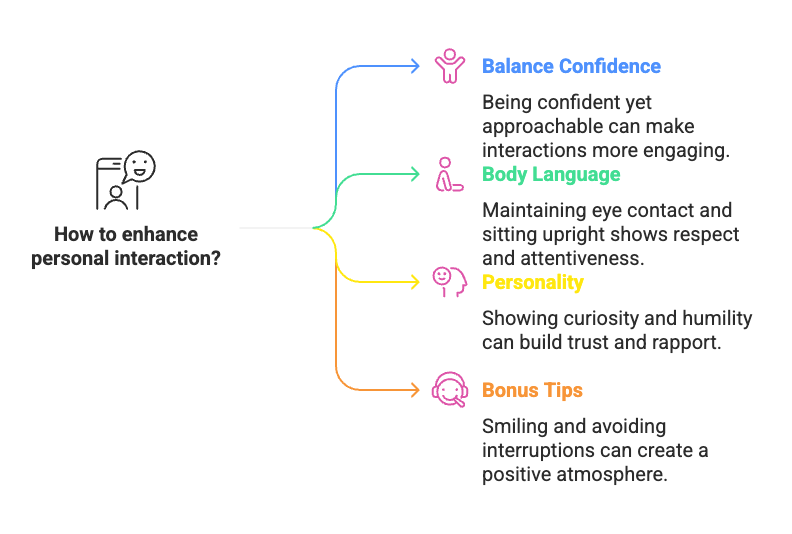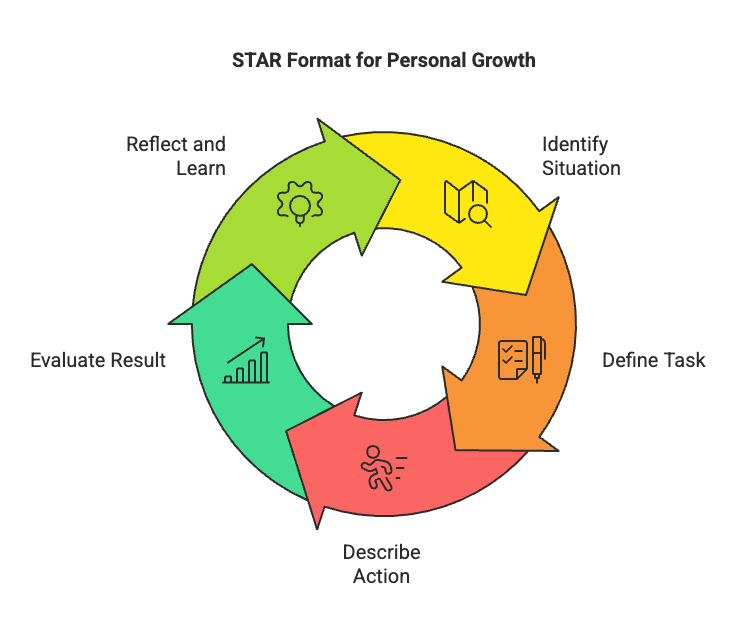CAT Interviews: Common Mistakes to Avoid | CAT Interview Preparation Guide PDF Download
- We all believe we can present the best version of ourselves in a 20-minute interview—but when the pressure’s on, it’s not that simple. Without the right preparation, even the most confident candidates can stumble.
- The CAT interview (Personal Interview or PI) is a crucial step in securing admission into top B-schools like IIMs, XLRI, FMS, SPJIMR, and others.
- While many candidates focus heavily on written exams, interviews often become the differentiator.
- This guide highlights common mistakes students make during their MBA interviews, along with actionable advice on how to avoid them, helping you present yourself as a confident, authentic, and capable candidate.

1. Not Knowing Yourself Well Enough
What Happens:
Many candidates stumble on basic but critical questions like:
“Tell me about yourself”
“What are your strengths and weaknesses?”
“Why do you want to pursue an MBA?”
Why It’s a Problem:
These questions are not just icebreakers. They help interviewers assess your:
Self-awareness
Clarity of thought
Motivation and career direction
How to Avoid It:
Craft a compelling personal narrative
Structure your story: Education → Work Experience (if any) → What led you to pursue an MBA → Career goals.Know your strengths and weaknesses
Prepare 2–3 of each, supported by real-life examples. Choose examples that show reflection and growth.Keep it concise
Be able to summarise your background confidently in 90 seconds or less.Use the STAR method
For any example you give, structure it with:
Situation → Task → Action → Result
2. Faking Your Motivation for an MBA
What Happens:
Some candidates resort to vague or overused statements like:
“I want to become a CEO.”
“Everyone around me is doing an MBA.”
Why It’s a Problem:
Interviewers can quickly sense a lack of genuine motivation. It shows poor self-reflection and weakens your credibility.
How to Avoid It:
Do your homework: Research the institute’s curriculum, clubs, faculty, and placement stats. Be specific about what excites you.
Align your goals with the program: Show how the MBA fills your current skill gaps or accelerates your transition to a new role/industry.
Answer the “Why MBA, Why Now, and Why This School” questions clearly
Example:
“After two years in marketing, I realised I need stronger strategic and analytical skills to move into brand management. An MBA from [Institute] offers the right mix of courses and peer learning to help me make that shift.”

3. Overloading Answers or Going Off-Track
What Happens:
Candidates sometimes ramble or drift away from the question—especially when nervous or trying to impress.
Why It’s a Problem:
This signals poor communication, lack of clarity, and difficulty in thinking under pressure—traits B-schools want to avoid.
How to Avoid It:
Keep it concise: Aim to wrap up each answer in 1–2 minutes. Less is more when well-structured.
Use a framework like PEACE
Point – What is your main idea?
Explanation – Add brief context.
Analysis – Why does it matter?
Conclusion – Tie it back to the question.
Example – (Optional) Real-life illustration if time allows.
Practice with a timer
Record yourself to check for clarity, tone, and pacing.
4. Being Too Formal or Too Casual
What Happens:
Some candidates speak in a stiff, robotic manner, trying to sound “professional,” while others swing to the opposite extreme—coming across as too laid-back, overconfident, or even dismissive.
Why It’s a Problem:
Both extremes can hurt your chances. Over-formality may seem unnatural or rehearsed. Over-casualness may signal arrogance or lack of seriousness. Either way, it disrupts rapport and questions your cultural fit.
How to Avoid:
Aim for balance: Be confident yet approachable.
Body language matters: Maintain eye contact, sit upright, and listen actively.
Let your personality come through: Show curiosity, humility, and genuine interest.
Bonus tips: Smile warmly and avoid interrupting. A calm, respectful tone goes a long way.

5. Neglecting Current Affairs & Industry Trends
What Happens:
Many candidates enter interviews unable to answer basic questions about the economy, current events, or major business trends. This includes being unaware of key government policies or global economic shifts.
Why It’s Bad:
It signals a lack of awareness and curiosity — qualities expected in future managers. Top B-schools, especially the IIMs, look for candidates who can connect classroom learning with real-world developments. Poor awareness can hurt not just interviews but also performance in group discussions and case studies.
How to Avoid:
Make it a habit to read at least one reliable news source daily — The Hindu, Economic Times, or Mint are good options. Focus your attention on:
Indian Economy (GDP, inflation, interest rates)
Global Business Trends (emerging tech, markets, etc.)
Social Issues (health, education, sustainability — key for IIM interviews)
Recent Policies (GST updates, digital economy moves, etc.)
Tip:
Know 5–6 recent developments in detail so you can speak confidently and add insights. Depth is better than trying to cover everything vaguely.
6. Ignoring the Importance of Mock Interviews
What Happens:
Some candidates skip mock interviews, thinking they’ll manage on the final day. They rely on instinct instead of preparation.
Why It’s Bad:
Without practice, it’s easy to freeze, fumble, or miss subtle cues from interviewers. Even well-prepared candidates can underperform if they haven’t rehearsed under pressure.
How to Avoid:
Do at least 3–5 full-length mock interviews with mentors, seniors, or professional coaches. Focus on getting feedback across all areas:
Content (clarity and structure of answers)
Delivery (tone, pace, engagement)
Body Language (posture, eye contact, gestures)
Confidence (overall presence)
Try to simulate real conditions — dress formally, maintain good posture, and stick to a timer.
Pro Tip:
Record your mock interviews and watch them. You’ll spot nervous tics, filler words, or weak answers you might not notice otherwise.
7. Not Preparing for HR Questions
What Happens:
Many candidates overlook common HR questions such as:
“Tell me about a time you failed.”
“How do you handle conflict in a team?”
“Describe a situation where you led a team.”
They focus too much on academics or technical prep and assume these questions are easy to handle on the spot.
Why It’s Bad:
HR questions are designed to assess your soft skills, emotional intelligence, and maturity — all crucial for management roles. Weak or generic answers here can leave a poor impression, no matter how strong your academics are.
How to Avoid:
Prepare thoughtful, real-life examples using the STAR format (Situation, Task, Action, Result). Choose stories that reflect:
Learning from failure
Handling team dynamics or conflicts
Taking initiative or showing leadership
Don’t just showcase successes — focus on how you handled challenges and what you learned from them.
Remember:
Interviewers aren’t looking for perfection. They value self-awareness, honesty, and the ability to reflect and grow.

8. Forgetting to Ask Questions at the End
What Happens:
When asked, “Do you have any questions for us?” many candidates simply say “no” or ask something generic — missing a valuable chance to stand out.
Why It’s Bad:
It can make you seem disinterested or underprepared. This moment is your chance to show genuine curiosity, enthusiasm for the institute, and awareness of what you’re getting into.
How to Avoid:
Come prepared with 2–3 thoughtful questions that show you've done your homework and care about your future at the institute. Examples:
“What makes [Institute] unique compared to other B-schools?”
“How does the institute support student-led initiatives or entrepreneurship?”
“Can you share an example of a student who made a meaningful impact here?”
Avoid overly transactional questions like “What’s the average package?” or “What’s the ROI?” — unless you frame them with broader context, such as career support or long-term growth.
Pro Tip:
Good questions spark conversations and leave a lasting impression. They help the interview feel more like a dialogue than an interrogation.
Final Tips for Success
1. Preparation
Know your story. Be clear about your background, career goals, and why you want to join the institute. Research the B-school thoroughly — understand its culture, values, programs, and recent initiatives.
2. Practice
Mock interviews are non-negotiable. They help you get comfortable with the format, refine your answers, and build confidence. Aim for realistic simulations and take feedback seriously.
3. Mindset
Stay calm, be honest, and be yourself. Interviewers appreciate authenticity more than memorized answers. Let your personality, passion, and clarity of thought come through.
4. Dress Code
Dress formally and neatly. Your appearance sets the tone even before you speak. A clean, professional look reflects seriousness and respect for the process.
5. Body Language
Your non-verbal cues matter. Sit upright, maintain eye contact, smile when appropriate, and speak clearly and confidently. Avoid fidgeting or crossing your arms.
Imagine this: The interview panel has met over a hundred candidates in just a few days. Resumes begin to blur, responses start to sound alike, and most candidates describe themselves as “passionate” and “hardworking.”
But then, one candidate gets up to leave—and says something that lingers. It might be a unique perspective, a memorable personal story, or a clear and honest articulation of their goals. Suddenly, that candidate stands out.
Interviewers aren’t just looking for textbook answers. They’re looking for authenticity—something that sets a candidate apart. So prepare not just to answer questions, but to be remembered.
|
21 videos|18 docs
|
FAQs on CAT Interviews: Common Mistakes to Avoid - CAT Interview Preparation Guide
| 1. What are the common mistakes to avoid in CAT interviews? |  |
| 2. Why is it important to know yourself well for a CAT interview? |  |
| 3. How can I prepare effectively for HR questions in a CAT interview? |  |
| 4. What role do mock interviews play in CAT interview preparation? |  |
| 5. What types of questions should I ask at the end of a CAT interview? |  |





















